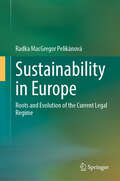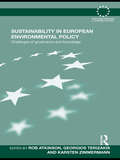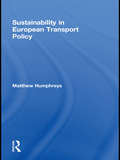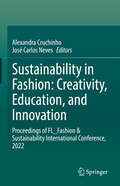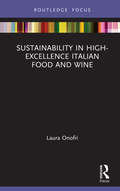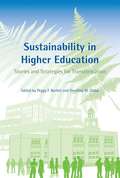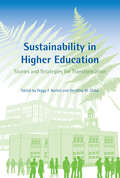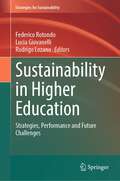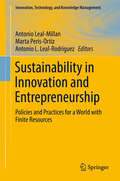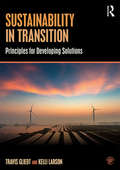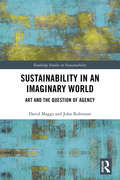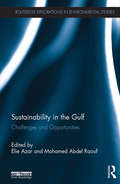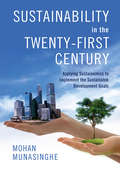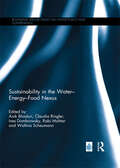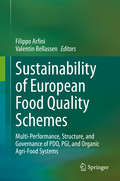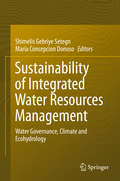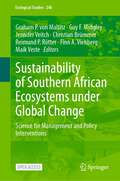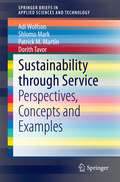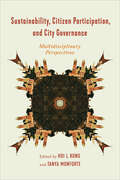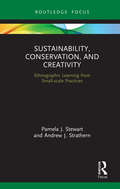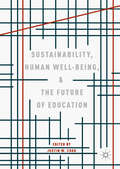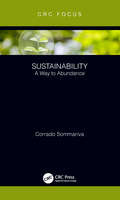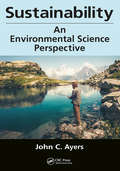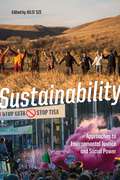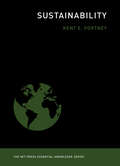- Table View
- List View
Sustainability in Europe: Roots and Evolution of the Current Legal Regime
by Radka MacGregor PelikánováThis book analyses the roots and evolution of the concept of sustainability in Europe and the European Union. As sustainability has always mirrored certain value judgments on justice and priorities, it is suitable for functionalist, analytical, contextual and historical comparisons via multidisciplinary studies combining various branches of the social sciences, law, philosophy, and economics. The aim of this book is to explore the roots and evolution of sustainability, so as to reveal how a European style of sustainability has emerged, one that is inextricably linked to our civilization and history. It identifies linear and cyclical phases with clear trends toward expanding the reach of sustainability, its subjects and their duties. The book offers a multidisciplinary, chronological and contextual overview of the evolution of sustainability until the 21st century, while also addressing its legal regime. Sustainability has many faces and needs to be approached in a dynamic manner through the lens of sustainable development or via a multi-stakeholder model that includes private subjects and corporate social responsibility. Although primarily intended for an audience with an advanced background in law, economics and philosophy, the book will also benefit a more general audience, particularly those who want to learn where the current sustainability concerns and legal regime actually came from.
Sustainability in European Environmental Policy: Challenges of Governance and Knowledge (Routledge Advances in European Politics)
by Rob AtkinsonThis book examines sustainability in European environmental policy and explores the related challenges of governance and knowledge. It provides an assessment of the EU sustainability strategy and concentrates on three key directives: Strategic Environmental Assessment (SEA), Emissions Trading (ET) and Air Pollution control. Sustainability in European Environmental Policy develops an innovative analytical model for the study of governance for sustainability, focusing on the potential synergies between new governance modes and different forms of knowledge. This cross-national and comparative volume features research on nine European countries and focuses on topics including governance, spatial planning and networks in the context of sustainability policy and its development within UK, Germany, Italy, Hungary, the Netherlands, Poland, Sweden, Greece and Norway. Making an important contribution to debates on governance, sustainability, knowledge and policy, this book will be of interest to students and scholars of political science, environmental studies, urban studies and European studies.
Sustainability in European Transport Policy
by Matthew HumphreysThe construction of the European Economic Communities in 1950 primarily set out to build an integrated economic zone in which national borders were, to a large extent, overcome. The ability of persons and goods to move freely within the economic zone was seminal in the realisation of economic integration. Underlying this, and therefore an implied necessity for European growth, an effective transport infrastructure was essential. However, with rising awareness of environmental issues, and a closer regard to sustainability of development, European transport systems and their regulation have come under scrutiny. This book sets out a critical analysis of the body of law and policy initiatives that constitute the EU's common transport policy. The development of the transport policy is charted through amending and founding Treaties as well as non-legislative documents. The book uses a model of sustainability as the basis for the analysis as the criteria for sustainable development were set out under Article Eleven of the Treaty on the Functioning of the European Union. However, sustainable development, when taken in the context of transport is difficult to reconcile with unbridled economic growth and unchecked freedom of movement and the book identifies a contradiction at the heart of European policy which can only become more accentuated as environmental trends become more explicit. The book argues that European regulation will eventually be forced to recognize this dichotomy, and take more forceful action to protect environmental and social development, even at the cost of economic progress. This book will be of great interest to researchers and students on European Union law and policy courses, transport studies courses and European integration courses. The book is of relevance to all those interested in environmental and transport matters.
Sustainability in Fashion: Proceedings of FL_Fashion & Sustainability International Conference, 2022
by Alexandra Cruchinho José Carlos NevesSustainability in Fashion: Creativity, Education, and Innovation is a book that focuses on how sustainability can be integrated into the fashion and clothing industry. The set of chapters provides peer-reviewed research covering a wide range of topics, mainly focused on how sustainability can be incorporated into fashion and textile education, how consumer behaviour and marketing affect sustainability in fashion (and vice versa) and how circular economy principles can be incorporated into clothing and textile supply chains. The chapters in this proceedings volume examine sustainability not only from the perspective of academia, but also from the perspective of industry. Working across sectors in this manner can facilitate the development of real projects that can greatly contribute to sustainability in the fashion industry.
Sustainability in High-Excellence Italian Food and Wine (Routledge Focus on Environment and Sustainability)
by Laura OnofriThis book presents contemporary case studies on selected Italian food and wine products to explore how traditional production and consumption models address and adapt to the sustainability challenges in the Italian high-excellence agri-food sector. Sustainability in High-Excellence Italian Food and Wine adopts a transaction cost economics approach, which is applied to five case-study chapters, each focusing on a key Italian agri-food product: Parmigiano Reggiano, Mozzarella di Bufala Campana, Amarone wine, Prosecco wine, and Prosciutto di San Daniele. The production and organization of these products face many challenges as they seek to balance competing priorities around economic viability, maintenance of high-quality standards and environmental and social impacts. The book argues that the development of sustainable and quality models requires changes to the structure and organization of the supply chain while also acknowledging that consumers are increasingly demanding authentic, high-excellence products that require reliable labeling systems and designations of origin mechanism. Recommending that hybrid structures, such as cooperatives and consortia, are the most cost-minimizing governance structures for the production, the book highlights that in the case of Italian excellency food, environmental sustainability and economic efficiency are not actually traded off but are reciprocally valorized through the regulation of high-quality standards. This book will be of great interest to students and scholars of food and wine excellence products, food systems and supply chains, agricultural production and economics and sustainable consumption.
Sustainability in Higher Education
by Peggy F. Barlett Geoffrey W. ChaseIn colleges and universities across the United States, students, faculty, and staff are forging new paths to sustainability. From private liberal arts colleges to major research institutions to community colleges, sustainability concerns are being integrated into curricula, policies, and programs. New divisions, degree programs, and courses of study cross traditional disciplinary boundaries; Sustainability Councils become part of campus governance; and new sustainability issues link to historic social and educational missions. In this book, leaders from twenty-four colleges and universities offer their stories of institutional and personal transformation. These stories document both the power of leadership -- whether by college presidents, faculty, staff, or student activists -- and the potential for institutions to redefine themselves. Chapters recount, among other things, how inclusive campus governance helped mobilize students at the University of South Carolina; how a course at the Menominee Nations tribal college linked sustainability and traditional knowledge; how the president of Furman University convinced a conservative campus community to make sustainability a strategic priority; how students at San Diego State University built sustainability into future governance while financing a LEED platinum-certified student center; and how sustainability transformed pedagogy in a lecture class at Penn State. As this book makes clear, there are many paths to sustainability in higher education. These stories offer a snapshot of what has been accomplished and a roadmap to what is possible. Colleges and Universities covered include Arizona State University - Central College, Iowa - College of the Menominee Nation, Wisconsin - Curriculum for the Bio-region Project, Pacific Northwest - Drury University, Missouri - Emory University, Georgia - Florida A&M University - Furman University, South Carolina - Green Mountain College, Vermont - Kapolani Community College, Honolulu, Hawaii - Pennsylvania State University -San Diego State University - Santa Clara University, California - Slippery Rock State University, Pennsylvania - Spelman College, Georgia - Unity College, Maine - University of Hawaii--Manoa - University of Michigan - University of South Carolina - University of South Florida - University of Wisconsin--Oshkosh - Warren Wilson College, North Carolina - Yale University
Sustainability in Higher Education: Stories and Strategies for Transformation (Urban and Industrial Environments)
by Peggy F. Barlett Geoffrey W. ChaseCampus leaders describe how community colleges, publicly funded universities, and private liberal arts colleges across America are integrating sustainability into curriculum, policies, and programs.In colleges and universities across the United States, students, faculty, and staff are forging new paths to sustainability. From private liberal arts colleges to major research institutions to community colleges, sustainability concerns are being integrated into curricula, policies, and programs. New divisions, degree programs, and courses of study cross traditional disciplinary boundaries; Sustainability Councils become part of campus governance; and new sustainability issues link to historic social and educational missions. In this book, leaders from twenty-four colleges and universities offer their stories of institutional and personal transformation. These stories document both the power of leadership—whether by college presidents, faculty, staff, or student activists—and the potential for institutions to redefine themselves. Chapters recount, among other things, how inclusive campus governance helped mobilize students at the University of South Carolina; how a course at the Menominee Nation's tribal college linked sustainability and traditional knowledge; how the president of Furman University convinced a conservative campus community to make sustainability a strategic priority; how students at San Diego State University built sustainability into future governance while financing a LEED platinum-certified student center; and how sustainability transformed pedagogy in a lecture class at Penn State. As this book makes clear, there are many paths to sustainability in higher education. These stories offer a snapshot of what has been accomplished and a roadmap to what is possible.Colleges and Universities CoveredArizona State University • Central College, Iowa • College of the Menominee Nation, Wisconsin • Curriculum for the Bio-region Project, Pacific Northwest • Drury University, Missouri • Emory University, Georgia • Florida A&M University • Furman University, South Carolina • Green Mountain College, Vermont • Kap'olani Community College, Honolulu, Hawaii • Pennsylvania State University •San Diego State University • Santa Clara University, California • Slippery Rock State University, Pennsylvania • Spelman College, Georgia • Unity College, Maine • University of Hawaii–Manoa • University of Michigan • University of South Carolina • University of South Florida • University of Wisconsin–Oshkosh • Warren Wilson College, North Carolina • Yale University
Sustainability in Higher Education: Strategies, Performance and Future Challenges (Strategies for Sustainability)
by Rodrigo Lozano Federico Rotondo Lucia GiovanelliThis contributed volume addresses the issue of how higher education institutions can systematically reorient themselves to help society become more sustainable. In particular, a strategic management approach is used to overcome the fragmentation of sustainability initiatives increasingly conducted by higher education institutions worldwide. In this book, eminent scholars in the field of sustainability in higher education combine their different backgrounds to propose conceptual frameworks for interpreting and measuring sustainability integration in higher education institutions. The chapters contained herein explore which processes and management tools should be used, as well the challenges to be faced, to make sustainable innovation effective. The cases present in this volume offer a guide for higher education institution management to lead the sustainability transition.
Sustainability in Innovation and Entrepreneurship
by Marta Peris-Ortiz Antonio Leal-Millan Antonio L. Leal-RodríguezThis book provides a richly illustrated study of sustainability, innovation and entrepreneurship. Specifically, it examines the ways in which governmental policies and practices modify the social conditions necessary to promote innovation in businesses and by so doing impact economic development. Exploring topics such as green innovation, green customer capital, smart cities, green entrepreneurship and environmental responsibility, this book presents some of the most current research and best practices in the field. In today's global economy, strategies, policies and practices that address the negative effects of human activity on the environment need to be incorporated into the business framework in order for companies to achieve a sustainable competitive advantage. Around the world, such changes have already resulted in a broad range of products, production methods and technical features that ensure environmental protection. At the same time, the mass media's communication of a deteriorating earth have motivated a growing number of citizens in both developed and developing nations to modify their consumption habits towards more ecological products. Consequently, an increasing number of companies are reacting to these changes in business and legal frameworks and consumer preferences by investing in new forms of green innovation or "eco-innovation" designed to promote both environmental and corporate sustainability. For example, Hewlett-Packard eliminated lead from its welding process; Wal-Mart reduced the emissions of their suppliers; and Cisco, Dell and IBM are investing in smart grids. This volume showcases pioneering efforts among companies, citizens, and government agencies that are moving from theory to practice by placing sustainability at the core of their development strategies.
Sustainability in Transition: Principles for Developing Solutions
by Travis Gliedt Kelli LarsonSustainability in Transition: Principles for Developing Solutions offers the first in-depth education-focused treatment of how to address sustainability in a comprehensive manner. The textbook is structured as a learning-centered approach to walk students through the process of linking sustainable behavior and decision-making to green innovation systems and triple-bottom-line economic development practices, in order to achieve sustainable change in incremental to transformational ways. All chapters combine theory and practice with the help of global case study and research study examples to illustrate barriers and best practices. Each chapter begins with learning objectives and ends with a 'check on learning' section that ties the main points back to the core themes of the book. Chapters include a section focused on measuring progress and a box comparing international research or case studies to the North American focus of the chapter. A list of additional academic sources for students that complement each chapter is included. Building sustainability tools, techniques, and competencies cumulatively with the help of problem- and project-based learning modules, Sustainability in Transition: Principles for Developing Solutions is a comprehensive resource for learning sustainability theory and doing sustainability practice. It will be essential reading for advanced undergraduate and graduate level students who have already completed introductory sustainability classes.
Sustainability in an Imaginary World: Art and the Question of Agency (Routledge Studies in Sustainability)
by John Robinson David MaggsSustainability in an Imaginary World explores the social agency of art and its connection to complex issues of sustainability. Over the past decade, interest in art’s agency has ballooned as an increasing number of fields turn to the arts with ever-expanding expectations. Yet just as art is being heralded as a magic bullet of social change, research is beginning to throw cautionary light on such enthusiasm, challenging the linear, prescriptive, instrumental expectations such transdisciplinary interactions often imply. In this, art finds itself at a treacherous crossroads, unable to turn a deaf ear to calls for help from an increasing number of ostensibly non-aesthetic fields, yet in answering such prescriptive urgencies, jeopardizing the very power for which its help was sought in the first place. This book goes in search of a way forward, proposing a theory of art aiming to preserve the integrity of arts practices within transdisciplinary mandates. This approach is then explored through a series of case studies developed in collaboration with some of Canada’s most prominent artists, including internationally renowned nature poet Don McKay; Italian composer and Head of Vancouver New Music, Giorgio Magnanesi; the renowned Electric Company Theatre, led by Kevin Kerr; and finally through a largescale multimedia installation aiming to reimagine the relationship between climate, culture, and human agency. Sustainability in an Imaginary World will be of great interest to students and scholars of arts-based research fields, sustainability studies, and environmental humanities.
Sustainability in the Gulf: Challenges and Opportunities (Routledge Explorations in Environmental Studies)
by Elie Azar Mohamed Abdel RaoufSustainability is a topic of great interest today, particularly for the Gulf Cooperation Council (GCC) countries, which have witnessed very rapid economic and demographic growth over the past decade. The observed growth has led to unsustainable consumption patterns of vital resources such as water, energy, and food, highlighting the need for an urgent shift towards green growth and sustainable development strategies. Sustainability in the Gulf covers the region’s contemporary development challenges through the lens of the UN’s Sustainable Development Goals (SDGs), which place sustainability at the centre of the solution to the current environmental, economic, and social imbalances facing GCC countries. The book presents multiple analyses of Gulf-specific sustainability topics, examining the current status, challenges, and opportunities, as well as identifying key lessons learned. Innovative and practical policy recommendations are provided, as well as new conceptual angles to the evolving academic debates on the post-oil era in the Gulf. Through chapters covering sector-related studies, as well as the socio-economic dimensions of the sustainability paradigm, this volume offers valuable insights into current research efforts made by the GCC states, proposing a way forward based on lessons learned. This is a valuable resource for students, academics, and researchers in the areas of Environmental Studies, Political Economy, and Economics of the GCC states.
Sustainability in the Twenty-First Century: Applying Sustainomics to Implement the Sustainable Development Goals
by Mohan MunasingheIn applying the innovative 'sustainomics' framework and identifying the balanced inclusive green growth (BIGG) path to achieve sustainability, this book provides a rigorous and practical analysis of sustainable development today. Developed and applied globally over the past twenty-five years by world renowned multi-disciplinary expert Mohan Munasinghe, sustainomics gives us an optimistic message: although our problems are serious, we can respond effectively by making development more sustainable, but only if we begin immediately. Sustainomics shows us the first practical steps in making the transition from the risky business-as-usual scenario to a safe and sustainable future for all. Some key features include: an explanation of the key principles of sustainomics, free of technical jargon; empirical case studies that are practical and policy-relevant over a wide range of time scales, countries, sectors, ecosystems and circumstances; annexes that provide mathematical and additional details; and an extensive and up-to-date bibliography to aid further research.
Sustainability in the Water-Energy-Food Nexus (Routledge Special Issues on Water Policy and Governance)
by Anik Bhaduri, Claudia Ringler, Ines Dombrowsky, Rabi Mohtar and Waltina ScheumannIt is beyond doubt that the interconnectedness between food, energy, water security and environmental sustainability exists and is getting amplified with increased globalization. It has been recognized that efforts to address only one part of a systemic problem by neglecting other inherently interlinked aspects may not lead to desirable and sustainable outcomes. In this perspective, policy- and decision- making requires a nexus approach that reduces trade-offs and builds synergies across sectors, and helps to reduce costs and increase benefits for humans and nature compared to independent approaches to the management of water, energy, food and the environment. In the past, work related to the Nexus has looked at the interactions between water and food or water and energy, but there has been a reluctance to bring forward a broader systematic perspective that captures the multiple sectors and resource dependencies while understanding its cost to the environment if we neglect these linkages. This book is a compilation of thirteen papers published previously as a special issue of Water International, contains significant pieces of work on the W-E-F nexus focusing on relevant tools, solutions and governance at local and broader human scales.
Sustainability of European Food Quality Schemes: Multi-Performance, Structure, and Governance of PDO, PGI, and Organic Agri-Food Systems
by Valentin Bellassen Filippo ArfiniThis edited volume evaluates recent EU quality policy, focusing on the structure, governance, technical specifications and performances – economic, environmental and social – of Food Quality Schemes (FQS) in the European Union and South East Asia. The intended benefits of FQS include generating a fair return for farmers and producers, and enabling consumers to make better‐informed purchasing choices through effective labeling. In addition, policy makers now consider FQS as a means of guaranteeing not only quality in food production, but also sustainability. Despite these potential benefits, the economic performance of the FQS (e.g. PDO, PGI, organic) has been variable. While some support significant value‐added production, with substantial benefits to producers, consumers and wider economies, many others have failed to become economically sustainable. In addition, the environmental and social performance of FQS remains largely unexamined, with the exception of the environmental performance of organic products. The editors examine these discrepancies and offer a nuanced evaluation of the effectiveness of such policies. Several unique features make this volume a key resource for those interested in FQS and in the sustainability of food products. The editors provide a concise description of the value chain, the governance and the technical specifications of 27 FQS in Europe and South East Asia. The editors also provide a sustainability assessment of each of these FQS, and support or question the view that FQS are moving from “quality” to “sustainability.” Finally, the volume serves as a repository of key data on these FQS. Readers have access to the raw data necessary to compute the indicators used in the sustainability assessment (eg. value added, number of jobs, quantity of fertilizers, etc), allowing them to conduct novel re-analysis. The book is designed for an interdisciplinary audience of academics, policy makers, and stakeholders. The compilation of FQS case studies makes it a useful reference for researchers and students of food policy, geography, food anthropology, local and rural development, local agri-food systems and agri-food chains. Stakeholders such as national and European regulators, entities responsible for FQS technical specifications, and embassy staff will also find the information relevant. Additionally, individuals helping to implement food quality schemes, including auditors, producers, and consumer associates, as well as stakeholders in the sustainability of food products, including farmers, farmer's associations, and environmental NGOs, will also find the information relevant and important for their work.
Sustainability of Integrated Water Resources Management
by Shimelis Gebriye Setegn Maria Concepcion DonosoThe main focus of this book is sustainable management of water resources in a changing climate. The book also addresses the question of how to define and measure the sustainability of Integrated Water Resources Management (IWRM). The sustainability of IWRM is an important issue when planning and/or developing policies that consider the impact of climate change, water governance and ecohydrology in the context of a more holistic approach to ensure sustainable management of water resources. Sustainable IWRM is more about processes, and relatively little systematic or rigorous work has been done to articulate what components are the most essential to ensure the ongoing sustainability of IWRM efforts. The chapters cover topics including global prospective of IWRM; allocation of environmental flows in IWRM; echohydrology, water resources and environmental sustainability; climate change and IWRM; IWRM and water governance including social, economic, public health and cultural aspects; climate change resiliency actions related to water resources management sustainability and tools in support of sustainability for IWRM. This book will be of interest to researchers, practitioners, water resources mangers, policy and decision makers, donors, international institutions, governmental and non-governmental organizations, educators, as well as graduate and undergraduate students. It is a useful reference for Integrated Water Resources Management (IWRM), ecohydrology, climate change impact and adaptations, water governance, environmental flows, geographic information system and modeling tools, water and energy nexus and related topics.
Sustainability of Southern African Ecosystems under Global Change: Science for Management and Policy Interventions (Ecological Studies #248)
by Maik Veste Graham P. von Maltitz Guy F. Midgley Jennifer Veitch Christian Brümmer Reimund P. Rötter Finn A. ViehbergThis open access book about the sustainability of marine and terrestrial ecosystems in southern Africa provides a synthesis of the research program Science Partnerships for the Adaptation to Complex Earth System Processes (SPACES II, 2018-2022). It addresses the scientific, social, and economic issues related to climate change, its potential impacts on the various ecosystems, adaptations, and management interventions for enhancing systems resilience in Southern Africa. It is written by numerous scientists from African states and Germany and summarizes the latest research findings, which are of great relevance for a better understanding of climate change impacts, adaptations, and vulnerabilities as well as for developing management options and policy options to reduce the associated risks. This is crucial considering that the projected African population increase is exceptional. Furthermore, climate change is assumed to hit southern Africa extremely hard with a significant increase in extreme events and the frequency of severe droughts, heat waves, and flooding. Southern Africa hosts a high variety of ecosystems, which belongs to important biodiversity hotspots for unique flora and fauna. The surrounding oceans form, in turn, a bottle neck within the ocean’s global thermohaline circulation, act as a still poorly understood carbon sink and source and play an important role for fisheries as they are highly productive. Considering these important aspects, the book is an important interdisciplinary contribution to the scientific literature and will find a wide readership.The book is aimed at students, teachers, and scientists in the fields of terrestrial and marine ecology, environmental, nature and landscape planning, agriculture, environmental and resource management, biodiversity, and nature conservation, as well as scientists and representatives in specialised authorities and associations, nature conservationists, and policy makers of related disciplines.
Sustainability through Service
by Adi Wolfson Shlomo Mark Patrick M. Martin Dorith TavorThis book discusses the mutual relationship between service and sustainability. It covers methodologies and approaches and describes measurements and tools that can promote sustainability on the service market. Lastly, it presents the different applications of sustainability, together with examples of sustainable services. Environmental concerns have become integral to any decision-making process in the design and implementation of goods and services. With the increasing dominance of the service sector, and as service systems become more complex and interdisciplinary, the focus must move from the exchange of products to that of services. Newly created services should thus aim to incorporate sustainability into their designs while viewing sustainability as a service in its own right. Integrating sustainability in the service design and development process is essential to improving the sustainability of our society and preserving the environment. Moreover, doing so shifts the service boundaries from values that are focused only on personal, local, and current needs and economic profit to those that are broader and more future oriented, ultimately placing greater social and environmental responsibility on all stakeholders. In addition, it advances the current state-of-the-art in sustainable development and service design and contributes to improving the quality of life on a global scale.
Sustainability, Citizen Participation, and City Governance: Multidisciplinary Perspectives
by Hoi L. Kong Tanya MonforteThe inaction of nation states and international bodies has posed significant risks to the environment. By contrast, cities are sites of action and innovation. In Sustainability, Citizen Participation, and City Governance, contributors researching in the areas of law, urban planning, geography, and philosophy identify approaches for tackling many of the most challenging environmental problems facing cities today. Sustainability, Citizen Participation, and City Governance facilitates two strands of dialogue about climate change. First, it integrates legal perspectives into policy debates about urban sustainability and governance, from which law has typically stood apart. Second, it brings case studies from Quebec into a rare conversation with examples drawn from elsewhere in Canada. The collection proposes humane and inclusive processes for arriving at effective policy outcomes. Some chapters examine governance mechanisms that reconcile clashes of incommensurable values and resolve conflicts about collective interests. Other chapters provide platforms for social movements that have faced obstacles to communicating to a broad public. The collection’s proposals respond to drastic changes in urban environments. Some changes are imminent. Others are upon us already. All threaten the present and future well-being of urban communities.
Sustainability, Conservation, and Creativity: Ethnographic Learning from Small-scale Practices (Routledge Focus on Environment and Sustainability)
by Pamela J. Stewart Andrew J. StrathernBy examining how small communities have dealt with forces of change and have sought to maintain themselves over time, this book offers pointers and lessons for conservation practices at all levels of society. "Sustainability" has become an increasingly popular term as a signal of concerns with long-term environmental consequences of human actions. Sustainability as a goal has started to replace "development" as a way of describing policies that go beyond the concept of increasing commercial production or making monetary profits from enterprises. By focusing on topical case histories on agricultural activity, stock-keeping, cash cropping, mining, and renewable energy, the authors highlight how ethnographic studies can and should inform policy decisions at both local and global levels. This book will be of great interest to students and scholars of applied anthropology, sociology, and development studies.
Sustainability, Human Well-Being, and the Future of Education
by Justin W. CookThis open access book explores the key dimensions of a future education system designed to enable individuals, schools, and communities to achieve the twin twenty-first century challenges of sustainability and human well-being. For much of the twentieth century, Western education systems prepared students to enter the workforce, contribute to society and succeed in relatively predictable contexts. Today, people are at the controls of the planet—making decisions that are dramatically reshaping social, economic, and environmental systems at a global scale. What is education’s purpose in this new reality? What and how must we learn now? The volatility and uncertainty caused by digitalization, globalization, and climate change weave a common backdrop through each chapter. Using case studies drawn from Finland and the US, chapter authors explore various aspects of learning and education system design through the lenses of sustainability and human well-being to evaluate how our understanding and practice of education must transform. Using their scholarly research and experience as practitioners, the authors propose new approaches to preparing learners for a new frontier of the human experience fraught with risks but full of opportunity.
Sustainability: A Way to Abundance
by Corrado SommarivaThe book describes mechanisms whereby the Earth naturally thrives towards energy and resources abundance and how unsustainable industrial practices alter this trend. Introduces the concept of earth energy and associates this to the conditions of the biosphere and emphasizes the possibilities with inexpensive wind and solar energy Provides a good quantification of the concepts of sustainability and its effects on the environmentn and critical analysis and updates to the relationships between the environmental impact, affluence and technology
Sustainability: An Environmental Science Perspective
by John C. AyersThis book presents an earth science-based overview of the challenges to sustainability. It provides a detailed study of climate change, as well as energy, food, and water security across different regions. The author uncovers the problems caused by current social and environmental practices, and offers potential solutions. Focusing on systems theory, footprint analysis, risk, and resilience, many examples are given of how to use resources sustainably, especially common pool resources such as the atmosphere, oceans, and groundwater. The book develops its ideas from an array of practical case studies, centering on communal objectives and shared responsibilities.
Sustainability: Approaches to Environmental Justice and Social Power
by Julie SzeA critical resource for approaching sustainability across the disciplines Sustainability and social justice remain elusive even though each is unattainable without the other. Across the industrialized West and the Global South, unsustainable practices and social inequities exacerbate one another. How do social justice and sustainability connect? What does sustainability mean and, most importantly, how can we achieve it with justice? This volume tackles these questions, placing social justice and interdisciplinary approaches at the center of efforts for a more sustainable world. Contributors present empirical case studies that illustrate how sustainability can take place without contributing to social inequality. From indigenous land rights, climate conflict, militarization and urban drought resilience, the book offers examples of ways in which sustainability and social justice strengthen one another. Through an understanding of history, diverse cultural traditions, and complexity in relation to race, class, and gender, this volume demonstrates ways in which sustainability can help to shape better and more robust solutions to the world’s most pressing problems. Blending methods from the humanities, environmental sciences and the humanistic social sciences, this book offers an essential guide for the next generation of global citizens.
Sustainability: Creating The Green Metropolis (MIT Press Essential Knowledge series)
by Kent E. PortneyA concise and accessible examination of sustainability in a range of contemporary contexts, from economic development to government policy.The word “sustainability” has been connected to everything from a certain kind of economic development to corporate promises about improved supply sourcing. But despite the apparent ubiquity of the term, the concept of sustainability has come to mean a number of specific things. In this accessible guide to the meanings of sustainability, Kent Portney describes the evolution of the idea and examines its application in a variety of contemporary contexts—from economic growth and consumption to government policy and urban planning.Portney takes as his starting point the 1987 definition by the World Commission on Environment and Development of sustainability as economic development activity that “meets the needs of the present without compromising the ability of future generations to meet their own needs.” At its heart, Portney explains, sustainability focuses on the use and depletion of natural resources. It is not the same as environmental protection or natural resource conservation; it is more about finding some sort of steady state so that the earth can support both human population and economic growth. Portney looks at political opposition to the promotion of sustainability, which usually questions the need for sustainability or calls its costs unacceptable; collective and individual consumption of material goods and resources and to what extent they must be curtailed to achieve sustainability; the role of the private sector, and the co-opting of sustainability by corporations; government policy on sustainability at the international, national, and subnational levels; and how cities could become models for sustainability action.
